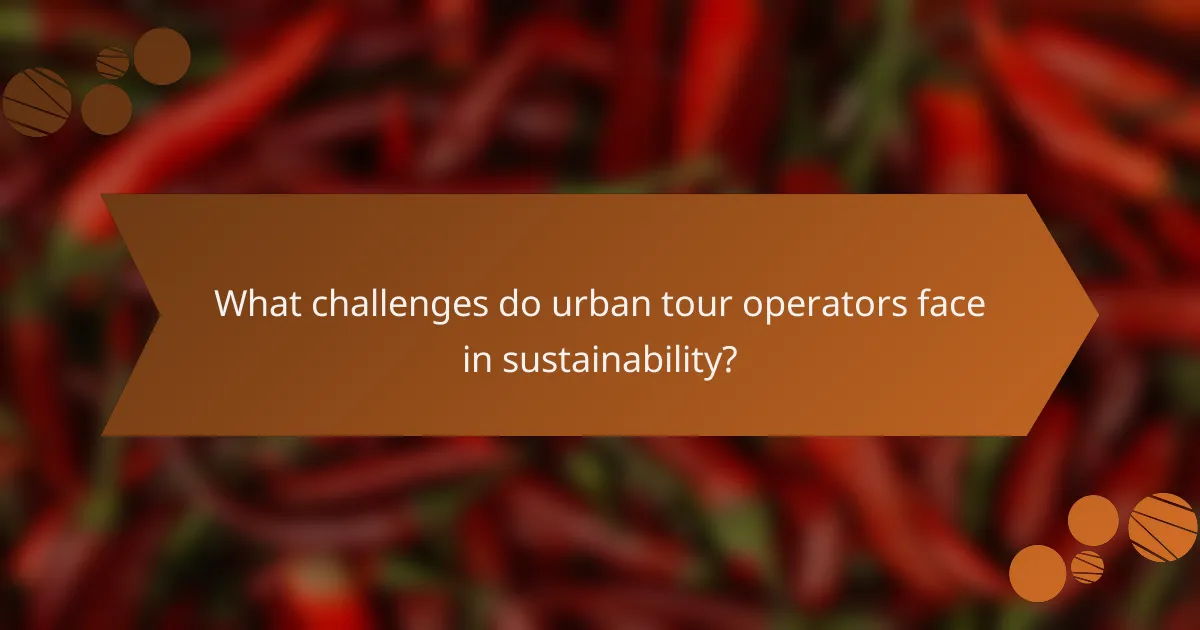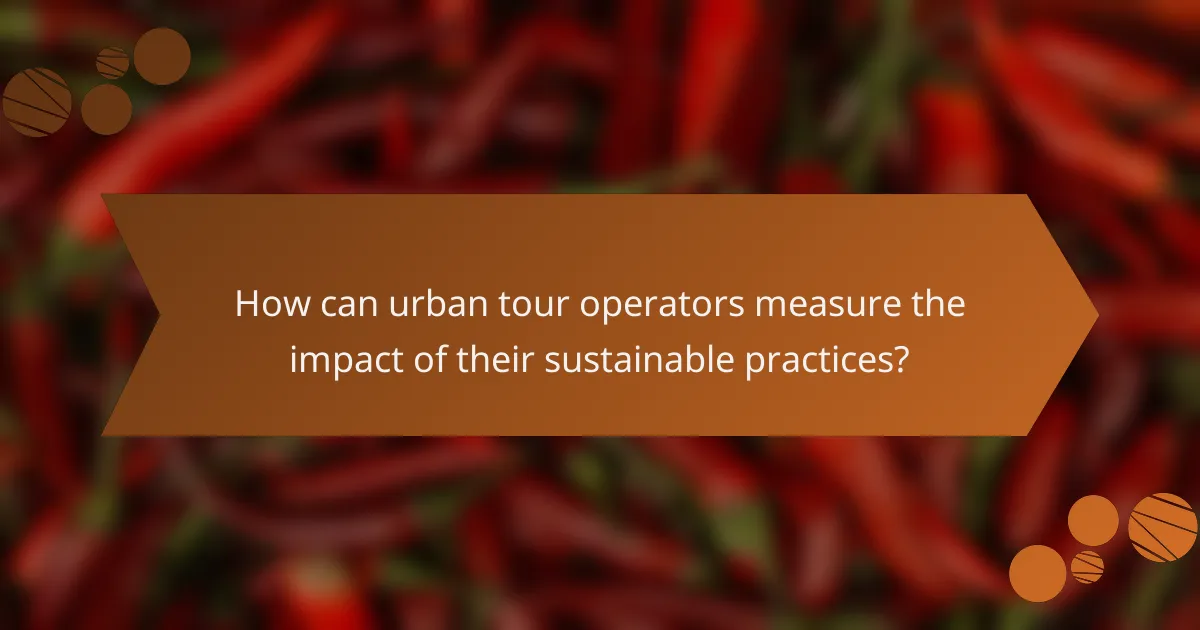Urban tour operators play a crucial role in promoting sustainability by adopting eco-friendly practices that enhance both the tourist experience and community well-being. By focusing on areas such as transportation, waste management, and cultural engagement, these operators can significantly reduce their environmental impact while attracting a growing demographic of environmentally conscious travelers.

How can urban tour operators implement sustainable practices?
Urban tour operators can implement sustainable practices by integrating eco-friendly methods into their operations, focusing on transportation, partnerships, waste management, cultural experiences, and community engagement. These practices not only reduce environmental impact but also enhance the overall experience for tourists and local communities.
Utilizing eco-friendly transportation options
Choosing eco-friendly transportation options is crucial for reducing carbon footprints. Operators can consider electric vehicles, bicycles, or public transport systems to minimize emissions. For instance, offering bike tours or using electric shuttles can significantly lower environmental impact while providing unique experiences.
Additionally, operators should educate tourists on the benefits of sustainable transport choices, encouraging them to use public transport or walk when exploring urban areas. This not only supports sustainability but also allows tourists to engage more deeply with the city.
Partnering with local sustainable businesses
Forming partnerships with local sustainable businesses can enhance tour offerings and promote the local economy. Operators should seek collaborations with eco-friendly hotels, restaurants that source local ingredients, and artisans who practice sustainable methods. This not only supports local enterprises but also provides tourists with authentic experiences.
For example, a tour operator might include meals at a farm-to-table restaurant or visits to local markets that prioritize sustainability. Such partnerships can create a more enriching experience for tourists while reinforcing the importance of supporting local economies.
Adopting waste reduction strategies
Implementing waste reduction strategies is essential for urban tour operators aiming to minimize their environmental impact. This can include practices such as reducing single-use plastics, encouraging recycling, and providing digital materials instead of printed brochures. Operators should also train staff on waste management practices.
For instance, offering reusable water bottles to tourists can significantly reduce plastic waste. Additionally, operators can set up waste sorting stations during tours to educate participants on proper disposal methods, fostering a culture of sustainability.
Incorporating local cultural experiences
Incorporating local cultural experiences into tours can enhance sustainability by promoting cultural heritage and community engagement. Operators should aim to include activities that showcase local traditions, art, and history, allowing tourists to connect with the community.
Examples include guided tours of historical neighborhoods, workshops with local artisans, or participation in traditional festivals. These experiences not only enrich the tourist experience but also help preserve local culture and traditions.
Engaging in community conservation projects
Engaging in community conservation projects allows urban tour operators to contribute positively to the environment and local communities. Operators can organize volunteer opportunities for tourists, such as tree planting or clean-up events, which foster a sense of responsibility and connection to the area.
Additionally, partnering with local conservation organizations can provide tourists with insights into ongoing efforts to protect urban ecosystems. This engagement not only benefits the environment but also enhances the overall travel experience by creating meaningful connections between tourists and the community.

What are the benefits of sustainable practices for tour operators?
Sustainable practices offer numerous advantages for tour operators, including improved brand reputation, increased customer loyalty, and potential cost savings. By adopting eco-friendly methods, operators can enhance their appeal to a growing market of environmentally conscious travelers.
Enhanced brand reputation
Implementing sustainable practices can significantly enhance a tour operator’s brand reputation. Consumers today are increasingly aware of environmental issues and prefer businesses that demonstrate social responsibility. By showcasing commitment to sustainability, operators can differentiate themselves in a competitive market.
For example, using local guides, supporting community projects, or minimizing waste can create a positive image. This reputation can lead to increased customer trust and word-of-mouth referrals, which are invaluable for business growth.
Attracting eco-conscious travelers
Eco-conscious travelers actively seek out tour operators that prioritize sustainability. By promoting eco-friendly tours and experiences, operators can tap into this demographic, which is often willing to pay a premium for responsible travel options. Highlighting sustainable initiatives in marketing materials can attract these travelers effectively.
Offering unique experiences, such as wildlife conservation tours or cultural immersion programs, can further appeal to this audience. Operators should consider partnering with local environmental organizations to enhance credibility and attract more eco-minded customers.
Cost savings through efficiency
Sustainable practices can lead to significant cost savings for tour operators through increased operational efficiency. For instance, reducing energy consumption by using energy-efficient vehicles or implementing waste reduction strategies can lower overhead costs. These savings can be reinvested into the business or passed on to customers.
Additionally, optimizing resource use, such as water and materials, can minimize expenses. Operators should regularly assess their operations for areas where sustainability can improve efficiency and reduce costs.
Compliance with regulations
Adopting sustainable practices helps tour operators stay compliant with local and international regulations aimed at protecting the environment. Many regions have specific laws regarding waste management, emissions, and conservation efforts that operators must adhere to. By proactively implementing sustainable measures, operators can avoid potential fines and legal issues.
Staying informed about relevant regulations and industry standards is crucial. Operators should consider participating in sustainability certifications, which can provide guidance on compliance while enhancing their marketability to eco-conscious travelers.

What challenges do urban tour operators face in sustainability?
Urban tour operators encounter several significant challenges in implementing sustainable practices, including financial constraints, customer awareness, and resource availability. These obstacles can hinder their ability to adopt eco-friendly initiatives effectively.
High initial investment costs
One of the primary challenges for urban tour operators is the high initial investment required for sustainable practices. Upgrading to energy-efficient vehicles, implementing waste reduction systems, or adopting green technologies can demand substantial upfront capital. Operators must weigh these costs against potential long-term savings and environmental benefits.
To mitigate these costs, tour operators can explore partnerships with local governments or organizations that offer grants and incentives for sustainability initiatives. Additionally, implementing gradual changes rather than a complete overhaul can help spread out expenses over time.
Lack of awareness among customers
Many customers may not prioritize sustainability when selecting tour options, leading to a lack of demand for eco-friendly practices. This lack of awareness can make it challenging for operators to justify investments in sustainable initiatives. Educating customers about the environmental impact of their choices can help bridge this gap.
Operators can enhance customer awareness through marketing campaigns that highlight the benefits of sustainable tourism. Offering incentives, such as discounts for choosing eco-friendly options, can also encourage customers to make more sustainable choices.
Limited access to sustainable resources
Urban tour operators often face limited access to sustainable resources, such as eco-friendly materials or local organic food suppliers. This scarcity can hinder their ability to implement sustainable practices effectively. Identifying reliable suppliers and resources is crucial for successful sustainability efforts.
Operators can benefit from networking with other businesses in the sustainability sector to share resources and best practices. Additionally, joining local or regional sustainability initiatives can provide access to a broader range of sustainable resources and support.

What certifications can urban tour operators pursue for sustainability?
Urban tour operators can pursue several certifications to demonstrate their commitment to sustainability. These certifications help operators implement eco-friendly practices and enhance their marketability to environmentally conscious travelers.
Green Globe certification
Green Globe certification focuses on sustainable tourism practices across various sectors, including urban tour operations. To achieve this certification, operators must meet specific criteria related to energy efficiency, waste management, and community engagement.
Operators can start by conducting a sustainability assessment to identify areas for improvement. Implementing energy-saving measures and reducing waste can significantly enhance their chances of certification. Regular audits and documentation of sustainable practices are also essential for maintaining Green Globe status.
EarthCheck certification
EarthCheck certification is designed for tourism operators committed to environmental sustainability. This certification process involves benchmarking against global best practices and requires operators to implement a comprehensive sustainability management plan.
Urban tour operators should focus on areas such as carbon footprint reduction, water conservation, and local community support. Engaging with local stakeholders and continuously monitoring performance can help ensure compliance with EarthCheck standards.
Travelife certification
Travelife certification is aimed at tour operators who want to demonstrate their commitment to sustainable tourism. The certification process includes a self-assessment and an independent audit to verify compliance with environmental and social criteria.
To prepare for Travelife certification, urban tour operators should develop policies on responsible tourism, engage in fair labor practices, and promote local culture. Regular training for staff on sustainability practices is also beneficial for maintaining high standards and achieving certification.

How can urban tour operators measure the impact of their sustainable practices?
Urban tour operators can measure the impact of their sustainable practices by employing various metrics that assess environmental, social, and economic outcomes. Key areas of focus include tracking carbon emissions, gathering customer feedback, and evaluating collaborations with local organizations.
Tracking carbon footprint reductions
To effectively track carbon footprint reductions, urban tour operators should start by calculating their baseline emissions using tools like the Greenhouse Gas Protocol. This involves assessing emissions from transportation, accommodations, and activities offered. Regular monitoring can reveal trends and highlight areas for improvement.
Operators can implement carbon offset programs, such as investing in local reforestation projects or renewable energy initiatives, to further reduce their overall impact. Setting clear targets, like aiming for a 20% reduction in emissions over five years, can help guide these efforts.
Monitoring customer satisfaction surveys
Customer satisfaction surveys are essential for understanding how sustainable practices resonate with clients. Operators should include specific questions about eco-friendly initiatives, such as waste reduction efforts or local sourcing, to gauge customer perceptions and preferences.
Analyzing survey results can reveal insights into which sustainable practices are most valued by customers, allowing operators to adjust their offerings accordingly. Regularly conducting these surveys, ideally after each tour, ensures timely feedback and continuous improvement.
Evaluating partnerships with local organizations
Evaluating partnerships with local organizations helps urban tour operators assess the effectiveness of their sustainability initiatives. Collaborations with local businesses, conservation groups, or community projects can enhance the authenticity of tours while supporting the local economy.
Operators should regularly review the outcomes of these partnerships, such as increased community engagement or improved environmental conditions, to ensure they align with sustainability goals. Establishing clear objectives and metrics for these collaborations can enhance accountability and effectiveness.

What role does technology play in sustainable tourism?
Technology plays a crucial role in promoting sustainable tourism by enhancing efficiency, reducing waste, and improving the overall travel experience. Through digital tools and platforms, tour operators can optimize resource use and minimize their environmental impact.
Smart booking systems
Smart booking systems allow tour operators to manage reservations efficiently, reducing overbooking and resource waste. These systems can analyze customer preferences and travel patterns, enabling more tailored offerings that align with sustainable practices.
For example, using dynamic pricing can encourage travelers to book during off-peak times, which helps distribute tourist traffic more evenly and reduces strain on local resources. Operators should consider integrating these systems to enhance both sustainability and profitability.
Mobile applications for travelers
Mobile applications can guide travelers towards sustainable choices, such as eco-friendly accommodations and local experiences that support the community. These apps can provide real-time information about public transport options, reducing reliance on cars and minimizing carbon footprints.
Additionally, features like carbon footprint calculators can help travelers understand the environmental impact of their choices, encouraging more responsible behavior. Tour operators should promote these apps to enhance the sustainability of their offerings.
Data analytics for resource management
Data analytics enables tour operators to track resource usage, such as energy and water consumption, and identify areas for improvement. By analyzing this data, operators can implement strategies to reduce waste and enhance operational efficiency.
For instance, monitoring energy use in real-time can help identify peak usage times, allowing for adjustments that lower consumption. Operators should invest in data analytics tools to support their sustainability goals and improve overall performance.
Virtual and augmented reality experiences
Virtual and augmented reality (VR and AR) can provide immersive experiences that educate travelers about local ecosystems and cultures without physical impact. These technologies can simulate tours or experiences, allowing potential visitors to explore destinations before traveling.
By offering VR experiences, tour operators can reduce the number of physical trips, thus lowering carbon emissions. This approach can be particularly effective in urban settings, where congestion and environmental concerns are prevalent.
